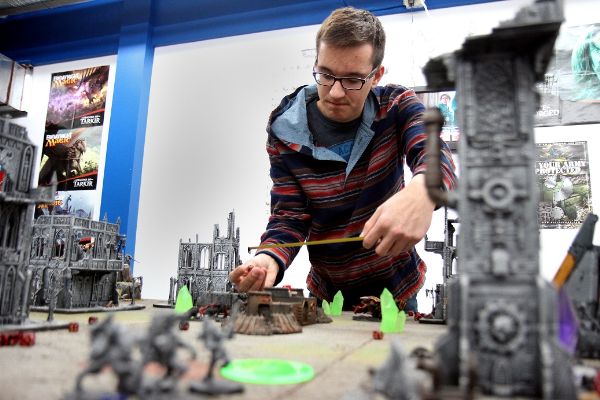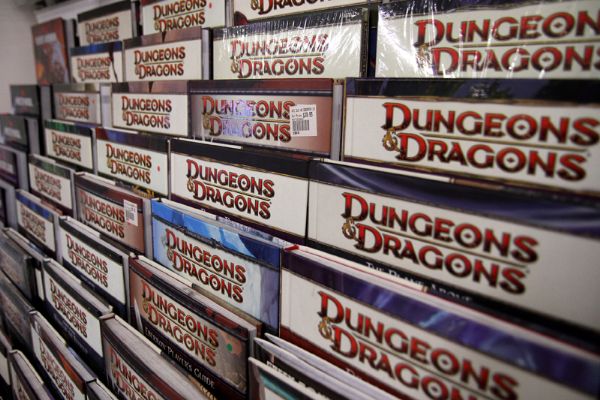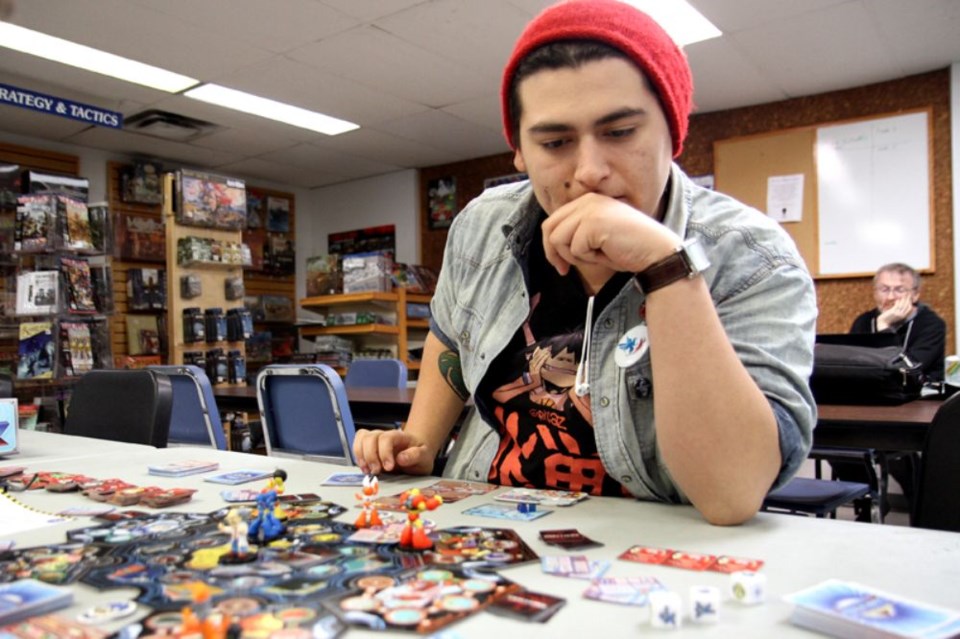Luke Perrier isn’t about to concede.
He prudently scans the large and cluttered Warhammer 40,000 board, a miniatures game he’s playing with friend and rival Matt Nguyen. Grabbing a nearby tape measure he begins to move his units – represented by monstrous-looking plastic figurines – as close to an objective marker as rules allow.
Those units get just close enough. The round ends. The game is tied.
This is happening in the basement of a strip mall off Red River Road at Thunder Games and Gifts. In a nearby room a dozen people of various ages are engaged in trading card games. A group of four plays Pokémon while the others favour Magic the Gathering.
Five kilometres away in one of the gaming rooms of another local retailer, The GameShelf, a pair of friends play the Mega Man board game. A nearby group of five play a co-operative game of Dungeons and Dragons.
“We can seat up to 70 players,” says The GameShelf owner Jackie Laderoute, “and there are some days where it is hard to find a place to sit down.”
This is the state of tabletop gaming, an industry that appears to be in the midst of a golden age. Video game publishers continue to push out mega blockbusters, like Electronic Arts shipping 13 million units of its recent Star Wars Battlefront, but none of that success has come at expense of its unplugged counterpart.
According to ICv2 magazine, hobby gaming continues its near-decade of double-digit annual growth. In 2014 the industry witnessed its sixth straight year of growth with a 14 per cent jump in sales in the U.S. and Canada over 2013.
The industry success isn’t just from the miniatures, trading card and roleplaying games. Classic games, whether it’s a family game, party game or something as simple as cribbage, are also factored in the industry’s rise.
These statistics are busting the myth that technology will eventually make the classic gaming market obsolete.
This myth was widely accepted as an inevitability less than a decade ago, and even once made up part of The GameShelf’s business plan.
“Originally the focus was more on (Local Area Network) gaming,” Laderoute says, speaking about the original owners’ focus, which was mainly based on the then-popular suspicion that “digital gaming was going to take over.
“When we bought (The GameShelf in 2009), that wasn’t our feeling so we took out all the computerized games and digital products and went back to strict tabletop gaming.”
It turned out to be the wise business decision. Ironically it was LAN gaming -- which requires multiple computers connected to a local network to play with friends in the same room -- that technology made obsolete.
Internet became better and more accessible while video game publishers were allowing players to meet virtually for multiplayer gaming via its own servers. Suddenly meeting at a physical location to play multiplayer video games became yesterday’s fad.
However, the fad of LAN gaming wasn’t its requirement for people to get together. In fact the current rise in tabletop gaming has much to do with the social void video games have since failed to fill.
“For me it’s always been about those social aspects,” says Katelyn Boulanger. “That’s why I joined Magic (The Gathering) to begin with; I wanted something that I could play with my friends at university.”
Boulanger writes for Lakehead University’s Student Union newspaper, The Argus. The student paper features her column on tabletop game reviews regularly.
Her interest in gaming started with Magic the Gathering, but she’s since dabbled in co-operative, deck building and resource gathering games among other genres.
Variety has helped broaden the appeal of gaming and the demographics of a gamer are anything but narrow. On any given Saturday you might find a mother playing Pokémon with her 10-year-old son while a group of 50-year-olds play Flames of War at the very next table.
This has led to what Boulanger describes as an incredibly inclusive community, despite some pop culture depictions.
“When you think of the stereotypical game store, say from the Big Bang Theory, they have jokes about girls walking in and getting stared down,” Boulanger says. “That has never been my experience. I’ve never been made to feel uncomfortable.”
Sitcoms may use stereotypes for easy laughs, but despite the sometimes inaccurate portrayal pop culture may actually be adding fuel to the gaming industry’s fire.
For Thunder Games and Gifts owner and operator Hoyt Nowak, shows like The Big Bang Theory have helped take the stigma out of the fun.
“Society has become more familiar with board games and how many board games are out there,” he says, adding that as more people begin playing games themselves they start to see the hobby as more of a “fun thing to do and not a nerd thing to do.”
Thunder Games and Gifts opened in April 2013, well into the dramatic rise of tabletop gaming. Because of the timing of its opening, Nowak hasn’t necessarily witnessed the rise of the industry from a retailer’s perspective but does agree that the social elements of games is pushing its popularity.
Back in the Thunder Games gaming room, just a short walk away from the glass counter Norwak stands behind, Perrier passes the turn of the now-tied Warhammer 40,000 game to Nguyen.
Nguyen draws a card and looks at it carefully. His glance moves to the game board, and then back to the card. This is exactly what he needed – a card with a random objective. With the objective already complete Nguyen can simply collect the points.
Despite Perrier’s strategic efforts just a turn ago, Nguyen wins without making another move.
“Sometimes this game is a lot about luck,” he says with a modest shrug.
Days from now, if a table is available, they’ll both test their luck again.
